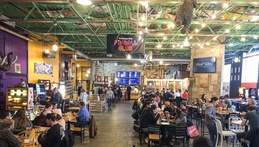The Power of Bread: At Pleasanton Bakery the Ancient Art of Bread-making Nourishes Body & Soul
July 17, 2002
“Real work is never a disagreeable chore. It contributes to life rather than taking from it; it gives us the chance to discover and hone our skills, to see how we fit into life, and to lose our sense of isolation by sharing a common goal with our fellow human beings.“ - Eknath Easwaran, The Compassionate UniverseAt the end of a two-track road in rural Manistee County, an ancient tradition is being kept alive and lovingly nurtured into a small family-owned business. Gerard Grabowski and Jan Shireman began Pleasanton Bakery nine years ago in a small building behind their house. Their dream was to create a home-based business that reflected their beliefs in organic agriculture, whole food nutrition and sustainable living, while producing a product that would be useful and valuable to the community.
A chance encounter with a chewy piece of bread at the Blissfest in the summer of 1990 gave them their first insight into the world of bread making. They quickly realized this was the business they had been looking for.
“As we started to research and connect with a greater circle of artisan bakers, crafts-people, organic grain providers and assorted “bread heads,“ we saw in this kind of bread-baking a chance to realize some of our dreams,“ Grabowski explained. “The hunger for organic, flavorful, and non-toxic foods coupled with a revitalization of traditional methods and a resurgence of community hearths was creating a bread renaissance in our country. It seemed to us that making this kind of bread would nourish both body and soul.“
A BRICK OVEN
Jan and Gerard decided to jump in with both feet and began building a traditional brick oven that would be the center of their bakery business. The brick oven method goes back to the early Egyptians, who paid the laborers who built the pyramids in bread. Brick ovens provide the ideal environment for baking bread – the loaves are baked right on the bricks, generous amounts of water are sprayed on the bread and bricks before the oven is sealed tight for a steamy bake. The oven retains heat for hours, allowing several batches of bread to be baked on one firing.
“We started on a very low budget, and a commercial baking oven would’ve been well over $10,000 to install. Instead, we built the brick oven ourselves for about $500, bartering bread to those who helped us along the way,“ Grabowski said. “We fuel it with downed and dead wood as well as piles of scrap wood from the local sawmill. The design of the baking chamber allows for nearly complete combustion, so it all has a limited effect on the environment.“
YEAST-FREE
To make the most nutritious and flavorful bread they could, they chose to use a process of natural leavening known as Flemish Desem. The Desem is made by carefully culturing whole-wheat flour and water into a sourdough starter. This eliminates the need for sweeteners, fats, milk or yeast.
“For 5,000 years bread was made without yeast,“ Shireman explained, “It is easier to digest, contains more nutrition and does not break down like yeast bread does. Our bread can keep for weeks and just needs a little water and a warm oven to make it fresh again.“
Their sourdough started, or ‘mother“ as they affectionately refer to it - is made from pure well water and organic flour, and the microbes are given the time and right environment to grow naturally into a leavening agent that makes it rise and retains all the nutrients from the grain.
The next essential step in their fledgling bakery business was to use organic fresh-milled flour, which costs more than five times as much as the kind that most commercial bakeries use. They connected with one of two bio-dynamic farmers in the nation to get organic hard spring wheat, which is the basis for all of their bread, and they began stone milling it themselves. A bag of organic flour costs $20, and a bag of non-organic, mass-produced flour that is shipped globally and perhaps months old costs around $8.
MILLING THE FLOUR
“As soon as any grain is milled into flour it starts to go bad, and it can test rancid within a month,“ Shireman explained. Their bread flour is made from grain they mill themselves using a cool milling method. It is much slower than high-speed commercial milling, which heats the grain and kills much of its vitamins and proteins. It takes about an hour to mill 50# of flour using the cool milling method, where a high speed operation can do that much in 5 minutes.
“The advantage of this kind of baking is that you start getting re-connected to the world around you in a more intimate way,“ Grabowski offered. “You try and maximize your benefits from what you do with your life, from working in a wholistic way with the Earth, to getting your grains to yield a bread that is truly nutritious.
“When you bake this way you start looking at bread real close, and you just can‘t waste your time processing that commercialized stuff from the store. Our work and our food should have a deep and sustaining value. When the costs to the Earth and overall health of consumers is considered, using organic fresh-milled flour and organic ingredients makes economic and ethical sense.“
All of this hard work and effort has paid off nine years later with an enthusiastic and loyal customer following, who are more than willing to pay the higher cost of the specialty bread (around $5). Pleasanton Bakery now produces an average of 500 loaves during their peak summer season, and just under 200 loaves in the winter.
They sell their bread – and get there early because they usually sell out – at the Farmer’s Market in Traverse City on Saturdays from May – October. Other outlets include Port City Organics in Manistee, Ware Farm and the IGA in Bear Lake, Shop-n-Save in Benzonia, L’Chayim Deli in Beulah, and Oryana Food Co-op in Traverse City.
Trending

A Week of Inspirational Speakers at the Ramsdell
Sabrina Little shines the light on how sports can shape character as part of the January Series at The Ramsdell Regional Cen… Read More >>
Ready, Set, Camp! Northern Michigan's 2026 Summer Camps
Yes, it’s January, but many summer camp registrations are now open or will soon be available. Below, we’ll share… Read More >>
LTC Announces Record-Breaking Conservation Year
Earlier this month, the Little Traverse Conservancy made a big announcement: 2025 was their best conservation year ever in t… Read More >>


